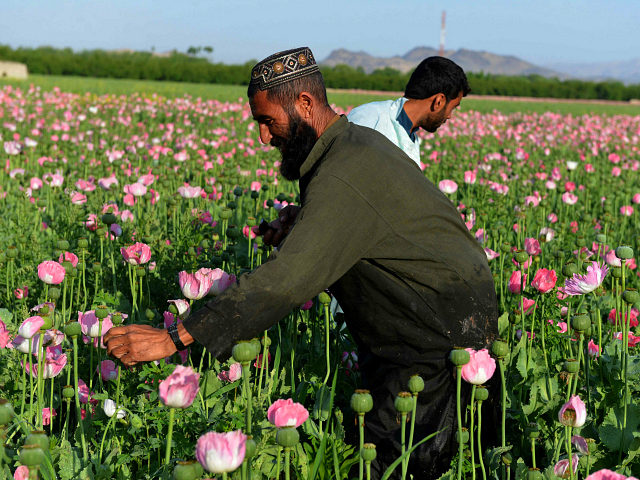WASHINGTON, DC — U.S. President Donald Trump’s South Asia strategy will focus on fighting the lucrative opium trade that is currently providing more than half of the Taliban’s estimated $400 million in annual funding, Secretary of Defense James Mattis told lawmakers, echoing other American officials.
“We’re going to look at where does it [opium trade] help[s] the Taliban and fight it from that direction, rather than going pretty much in a big way just after the farmers themselves,” Mattis told the House Armed Services Committee during a hearing Tuesday. “So there’s a way to cut this thing and reduce it by targeting the right location and the right node in the drug trade that will also undercut the Taliban’s fundraising.”
“Because it touches the Taliban, our counter-finance effort is something that we’re very much invested in and [have] integrated [into Trump’s strategy]” added Mattis.
Figures from the U.S. military and the United Nations show that the Taliban currently generates about 60 percent of its $400 million annual income from opium.
Mattis’ comments came in response to Rep. Michael Turner (R-OH) asking him and the chairman of the Joint Chiefs of Staff to explain how Trump’s South Asia strategy will combat the opium trade in Afghanistan.
Ohio is America’s opioid overdose capital.
The defense secretary said the Trump administration would target the opium-linked refineries and transportation nodes.
“Both the counter-finance aspects of the [South Asia] strategy and the counter-corruption are linked directly to the counter-narcotics campaign,” Secretary Mattis told the House members.
“As we look at this, we’re going to go after the counter-narcotics refineries, the transportation nodes — the bazaars as they call them where they barter,” he added. “And the reason is that’s where the Taliban actually accrues their taxation cash off of the [opium] trade. It’s not from the little guy down there who is farming his hearty crop of poppies.”
Consistent with assessments from the U.S. Special Inspector General for Afghanistan Reconstruction (SIGAR), a watchdog agency, Rep. Turner pointed out that opium cultivation is fueling terrorism and corruption in Afghanistan.
The U.S. has invested $714 billion in American taxpayer funds on security and reconstruction efforts, including some that have benefitted the production of opium and heroin.
Prior to Tuesday’s hearing, Breitbart News learned from the White House that the Trump administration is committed to disrupting the flow of deadly Afghan heroin into the United States.
Daniel Bucheli, a spokesman for the White House Office of National Drug Control Policy (ONDCP), told Breitbart News, “We continue to seek opportunities to support the Government of the Islamic Republic of Afghanistan to address this problem as it relates to the security of its nation and the national security interests of the United States. Through collaboration, we are identifying ways we can strengthen our efforts to combat the criminal organizations that produce and traffic heroin and provide alternative agricultural solutions to farmers who rely on income from poppy cultivation. We recognize the financial support the Taliban gains through expanded heroin production. Reducing the cultivation of poppy and the production of heroin in Afghanistan remains an important part of the United States’ overall effort in Afghanistan.”
At least one U.S. official has expressed concern about the potential link between the record availability of opium in Afghanistan and the unprecedented number (estimated at 60,000 in 2016) of fatal drug overdoses in the United States.
However, the DEA and White House insist that only a small amount of Afghan heroin makes it into the United States.
“Mexico is the primary supplier of heroin to the United States, and the United States is Mexico’s primary customer for heroin,” said the ONDCP spokesman. “In recent years, record levels of opium and heroin production in Afghanistan have not led to a corresponding rise in Southwest Asian heroin availability in the United States.”
The Trump administration has described the U.S. overdose crisis as a “national emergency,” but it is still working to develop a plan to deal with the issue.
Conquering more territory than at any other time since the U.S. military deposed its regime in late 2001 has allowed the Taliban to expand its opium operations, which in turn has produced more funds to pay for a historic number of terrorist attacks in recent months.
“We watched as we drew down too fast, too early — we watched the Taliban surge; as the Taliban surged, we watched the [opium] poppy surge right along with it,” said Mattis. “There’s no surprise here. The intelligence community had warned us about this. So it’s exactly what we were told would happen.”
U.S.-backed eradication efforts nearly disappeared under former President Barack Obama, who declared the American combat mission over at the end of 2014 and withdrew the majority of U.S. troops, prompting the opium trade to boom.
The U.S. Department of State (DOS) confirmed to Breitbart News that the Trump administration is still “coordinating to finalize” a much-needed update to America’s failed $8.6 billion counter-narcotics strategy in Afghanistan, a move that the previous administration postponed despite the record level of heroin production in the South Asian country.
U.S.-backed opium eradication activity has recently increased.

COMMENTS
Please let us know if you're having issues with commenting.